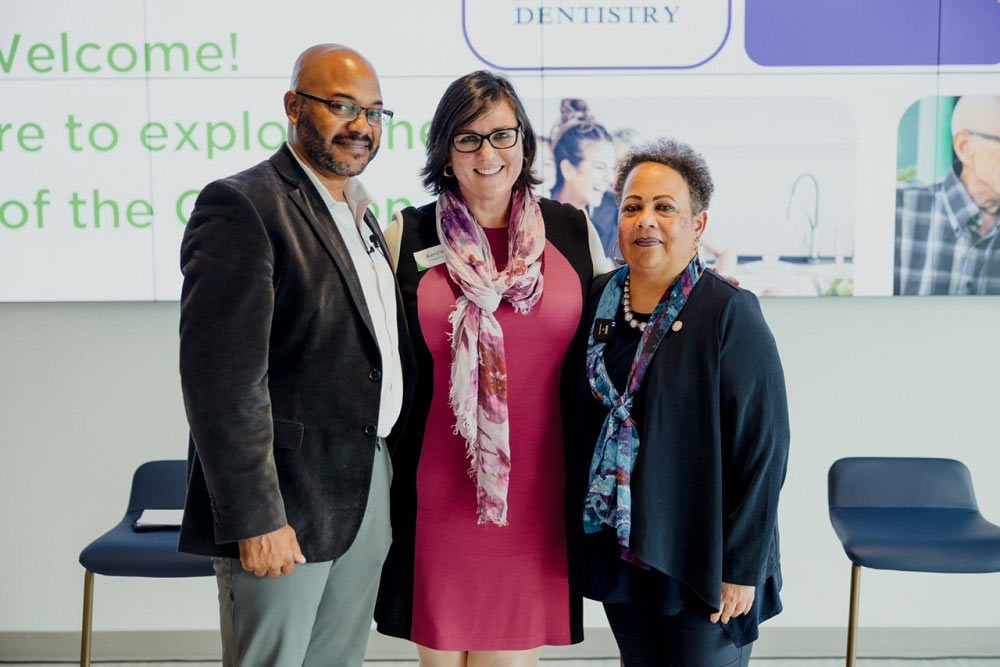The Washington Informer: Fighting senior oral health disparities across the District
Delta Dental partners with local institutions to improve oral health outcomes
By: Lindiwe Vilakazi

Leaders from Mary’s Center (Dr. Tollie Elliott), the Delta Dental Community Care Foundation (Kenzie Ferguson) and Howard University College of Dentistry (Dr. Andrea Jackson) at a reception to honor the first year of the Senior Oral Health Coalition Program
The Washington Informer – Seniors aged 65 and older are the most vulnerable population when facing access to proper oral health care in the United States. The Delta Dental Community Care Foundation, in conjunction with Howard University College of Dentistry and Mary’s Center – a Federally Qualified Health Center, launched the Senior Oral Health Coalition Program to address this growing public health crisis and disparities among seniors, particularly BIPOC community members.
The groundbreaking collaborative held a reception at Howard University’s Centers of Excellence on June 14 to honor the first anniversary and promote the goals of the program – to provide underserved senior residents of Washington, D.C. with greater equity and access to oral health care.
“It was important for us to partner with Howard University College of Dentistry, one of the nation’s leading dental schools and great pillar in the community, which also helps with representation. Having care providers who look like you is critical as we try to tackle some of the barriers people face in oral health care. It was also important to partner with Mary’s Center as a way of ensuring treatment of the whole person,” said Kenzie Ferguson, Vice President, Foundation and Corporate Social Responsibility for Delta Dental. “Instead of handing our partners a check and asking them to tell us what they accomplished, our three organizations aligned on this cause to address it together.”
According to the National Institutes of Dental and Craniofacial Research, 54 percent of seniors over the age of 75 have fewer than 21 teeth remaining. Alarmingly, that proportion jumps to roughly 80 percent for older adults living in poverty. The research points to factors influencing poor oral care, namely socioeconomic challenges, limited health care coverage and access to healthy food options. These issues not only contribute to poor oral health, but a slew of medical issues such as heart disease, diabetes and stroke.
“When you look at the statistics, Black and Hispanic people are two to three times more likely to have untreated tooth decay. Through this program, we are trying to get to the root of why and understand the barriers that these individuals face, whether purely financial or if there are additional social factors at play. That’s why raising awareness of this issue is important – it is an urgent public health crisis in America,” Ferguson explained.
The multipronged approach of the Senior Oral Health Coalition Program consists of community-based programs, collective research, and comprehensive student training designed to close the gap in oral health disparities within some of the District’s most resource-insecure communities. The partnership between Mary’s Center and Howard University College of Dentistry has produced an even greater repository of resources to serve many local seniors in need.
Howard University College of Dentistry curriculum puts a strong emphasis on community engagement and service, with a large portion of its patient body consisting of low-income seniors. Students in training attend weekly community health fairs, provide health screenings, and offer one-on-one attention to learn about patients’ conditions and barriers that prevent attention to their oral health needs.
“We teach our students behavioral techniques – how to talk, explain the ‘tell, show, do’ method, and emphasize how their gentle mannerisms help manage the patient,” said Andrea D. Jackson, D.D.S., M.S., F.A.C.P., F.I.C.D., Dean and Professor of Howard University College of Dentistry. “When our students practice at Mary’s Center and other community health clinics, we give them the experience of working with underserved patients. We want them to carry that forward when they graduate so they can be part of giving back. We teach students that by being in partnership with medicine and systemic health care, we can enhance people’s health by giving them good oral care,” said Jackson.
Mary’s Center plays an equally important role in the coalition’s efforts. Tollie B. Elliott, Sr., M.D., Chief Executive Officer at Mary’s Center, stressed the importance of empowering patients when accessing oral and overall health care. “The goal is to help older adults become advocates of their health so that they are not coming in as victims of their fear but are active participants in their care,” Elliott said. “We aim to provide a team that is centered around seniors to emphasize that their voice matters. We encourage them to speak up when they need care and to not be afraid to use their voice once they get in the dental chair.”
While the Senior Oral Health Coalition Program is still in its infancy, it has already made a significant impact in the lives of many older adults. The long-term aim is to lay the groundwork for a program that will outlast the collective efforts of the coalition. Doing so will build a better, healthier world for older adults in which they can age with dignity and be thriving members of our communities.
Read the original article here.